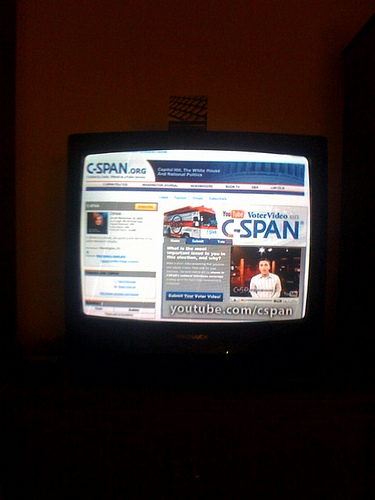Remediation pur sang
 Last tuesday I discovered the following news bulletin on NU.nl ‘Mogelijk tijdslot voor internet- uitzendingen publieke omroep’ in which is explained that resigning minister of Education, Culture and Science André Rouvoet plans to use a timelock on adult televison programs published on Uitzending Gemist (wiki) , an online televisionprogram archive of the Dutch public broadcasters. This law is already applied on the cable television network but according to minister Rouvoet seems to be of use on New Media aswell. Needless to say, this law is to prevent underaged from watching ‘non-suitable’ content.
Last tuesday I discovered the following news bulletin on NU.nl ‘Mogelijk tijdslot voor internet- uitzendingen publieke omroep’ in which is explained that resigning minister of Education, Culture and Science André Rouvoet plans to use a timelock on adult televison programs published on Uitzending Gemist (wiki) , an online televisionprogram archive of the Dutch public broadcasters. This law is already applied on the cable television network but according to minister Rouvoet seems to be of use on New Media aswell. Needless to say, this law is to prevent underaged from watching ‘non-suitable’ content.
The point is ofcourse; By blocking the content, adults who are legaly justified to watch adult content suffer from this the most. Many underaged, I believe, already found they’re way to adult content and wil have acces to the Uitzending Gemist timelocked content via Youtube as you can read in the news bulletin. It is in fact possible to reach ‘time-blocked’ content via a proxy server in an different time-zones. Questions about the effectivity of this law are therefore justified. Ofcourse, and happily, this news bulletin didn’t kept unnoticed from politicians such as Martijn van Dam (PvdA) and members of the Groenlinks party who announced asking questions in de Tweede Kamer about this case. These questions show the ‘new media’ perspective and the ‘law tackling’ strategy of the questioner. Clearly the questions emphasis focuses on the interpretation and the effectivity of this specific law. This is a logical step because this law has to be in the middle of the discussion for the best changes to adjust this law suitable for the medium. That this law is not suitable for the medium is also a point made clear by the questioner. And in fact shows the ignorance of the properties of new media by the people who wrote this law. I think this is a rather worrisome development since these laws influence our experience of new media.
Theorists Bolter and Grusin claim they’re ‘remediation’ theory applies for all new media and therefore is an characteristic. <1> But what is also stated in the book of Lev Manovich is that the pioneers of the personal computer Kay and Goldberger envisioned the personal computer to be a machine remediating old media with extra properties. For instance in simulating a paper document onto a computer screen ‘his idea was not simply imitate paper but rather to create “magical paper”’. <2> The new media characteristic that is jeopardised by the law in question is the ‘on demand’ function that is being hijacked and therefore takes away the magic in our experience of using new media. The fact that since the 1980 pioneers have taken effort to get this ‘magic’ in new media makes it all the more important to defend new media’s characteristics for the laws of people who cannot see what the ‘magic’ of new media is about.
<1> Manovich, Lev. ‘Software takes command’ Software Studies Initiative, licensed under Creative Commons, 2008. Consulted 7 sept 2010: http://lab.softwarestudies.com/2008/11/softbook.html
<2> Manovich, Lev. ‘Software takes command’ Software Studies Initiative, licensed under Creative Commons, 2008. Consulted 7 sept 2010: http://lab.softwarestudies.com/2008/11/softbook.html page 42.